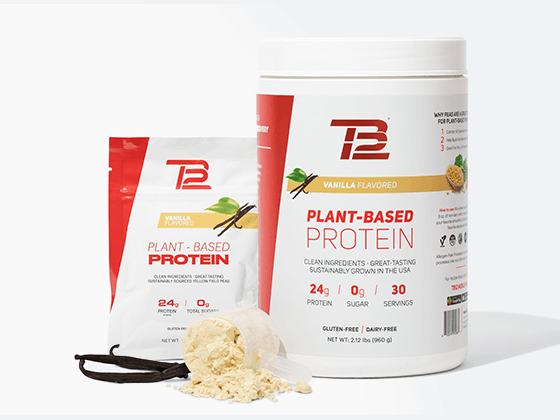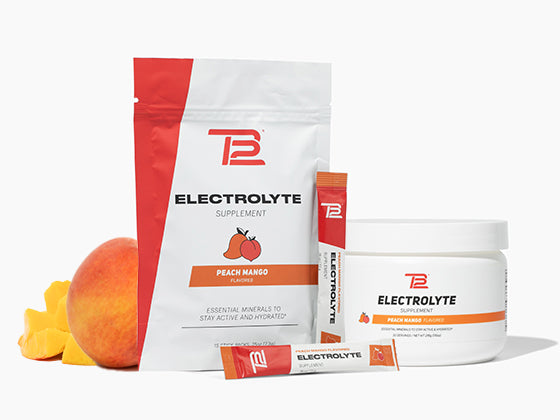First thing, pro-inflammatory foods can do a lot of damage.
If your diet contains significant amounts of processed, pro-inflammatory foods, the consequences can range from excess body fat in the short term to long-term issues like type-2 diabetes and related serious, chronic diseases. The good news is that if you bias your diet toward anti-inflammatory foods — real foods, mostly plants — you can enhance your health, recovery, and performance. It's important to remain mindful of foods that can do the most inflammatory damage. Here are five pro-inflammatory foods to minimize whenever possible.
There is considerable scientific evidence to support how refined sugar consumption can be addictive. The good news is that you can skip the ice cream for a melon and berries – fruit can satisfy your sweet tooth and also reward you with plenty of nutrients and fiber. Simple, thoughtful choices like these can help you limit your added sugar intake. Another example: you can switch out soda for sparkling water. If you're part of the food preparation process, suggest healthier variations of your favorite recipes. Foods that are high in added sugars include: soda, fruit juice, sweet tea, cookies, cakes, candies, yogurt with fruit, BBQ sauce, pasta sauce, soups, bread, ketchup, and cereals.
Refined Carbohydrates: Choose your carbs wisely.
It's important to know that ultra-processed foods high in carbohydrate and low in nutrient density may literally have been engineered by food scientists to be hyper-palatable. This is intentionally so you can't "only eat just one." Stick mostly to vegetables, fruits, and whole grains and steer toward eating more nutrients, fiber, and enzymes. For optimal results, try your best to eat a colorful selection of fruits and vegetables that are organic.
Foods that contain excess refined carbohydrates include: white bread, white flour, pizza dough, chips, crackers, most breakfast cereals, and many packaged foods. Fried Foods Regardless of how much you love fried chicken, fried foods are an inflammation nightmare. Cooking food at the high temperatures required to fry them produce something called advanced glycation end products (AGEs), which have been shown to contribute to chronic inflammation. Instead of fried chicken, opt for grilled. Instead of french fries, go for a baked or roasted potato. If friends or family are going on a fast-food run, request a salad or other plant-based alternative. Examples of fried foods include tempura (or anything battered), French fries, onion rings, fried clams, potato chips, fried dough, etc.
Processed Meats
Processed meats, such as hot dogs, lunchmeat, bacon, and more, have been linked to myriad of health problems. Just like with fried food, the high temperatures used to treat processed meat cause AGE production, which leads to inflammation. It's best to avoid processed meats as much as possible. Examples of processed meats include bacon, sausage, deli meats, ham, smoked meat, beef jerky, and hot dogs.
Alcohol
Overdoing it can take a toll on your health, performance, and ability to recover. Alcohol is a double whammy: It can be both inflammatory and dehydrating. Always aim for as close to zero as you can. If that seems impossible, count how many drinks you have over the course of a day and week, then pick a number 1-2 drinks less than what you normally have and make that your weekly goal.
Focus on Anti-Inflammatory, Immune-Supporting Foods
Here's what you can do. Eat vegetables as much as possible daily, and remember to eat your vegetables raw or lightly cooked, as this helps retain nutrients and ensures that you’re getting everything your body needs. Eat fatty fish like salmon, mackerel, and swordfish 2-3 times per week, or take an Omega-3 supplement if you don’t like fish or don’t have access. Avoid sugar whenever possible, and especially artificially sweet foods with added sugars. You will find “added sugars” as a line on all nutrition fact panels, so remember to read your food packaging carefully! Aim to consume half your body weight in grams of protein each day – especially protein from sources such as lean meat or nuts, seeds, and legumes. Consume fruits and vegetables that are rich in vitamin C, and consider supplementing with 600 mg of vitamin C per day if you’re not able to regularly consume those nutrient-rich foods.
“I try to avoid eating anything that comes in a box or a bag, as well as foods containing white flour or added sugars," Tom Brady says about his own experience. "That means I try to limit cereal, white bread, white rice, pasta, cakes, and cookies. Less inflammation is the key for me."





